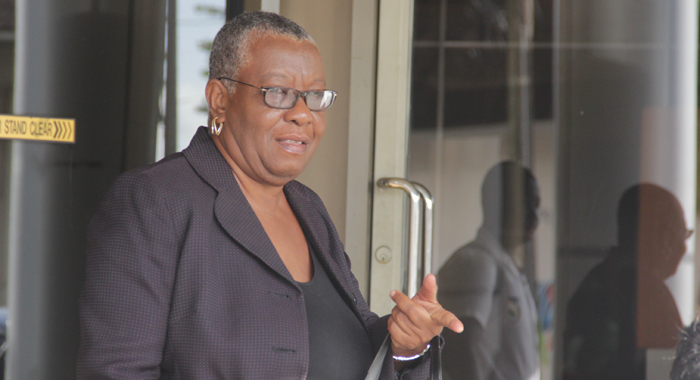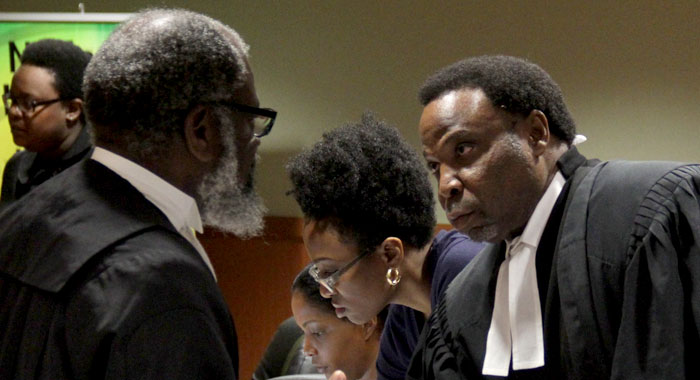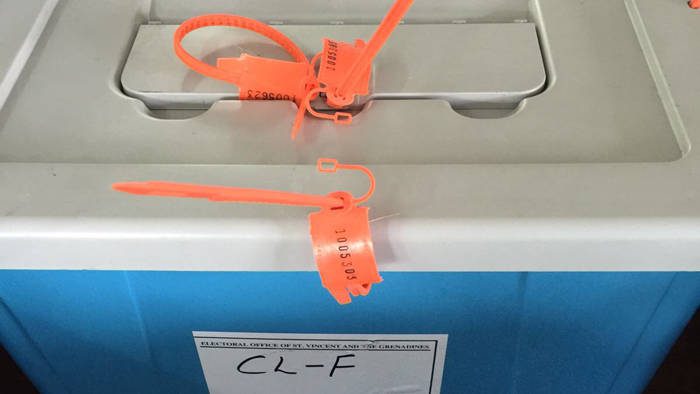While the then Leader of Opposition Arnhim Eustace allegedly did not object to the use of plastic ballot boxes in the 2015 general elections, the returning officers in the poll five years earlier had expressed concerns about them.
During the election petitions trial last week Thursday, Feb. 14, former Supervisor of Elections, Sylvia Findlay-Scrubb told the court that when the election law speaks of ballot boxes, it envisaged the wooden boxes that have keys.
These wooden boxes were last used in the 2005 vote.
Findlay-Scrubb, however, said that when she became Supervisor of Election in January 2009, the decision had already been made to switch to the plastic ballot boxes, which she said are “used internationally”.
She told the court that ahead of the 2015 election, representatives of the main political parties were invited to inspect the ballot boxes.
Arnhim Eustace, who was then leader of the opposition and president of
the New Democratic Party (NDP), inspected the ballot boxes on behalf of his
party and did not object to their use, Findlay-Scrubb said.

Her comments came as she was cross examined by Queen’s Counsel Stanley “Stalky” John, lead counsel for the NDP’s Benjamin “Ben” Exeter.
Exeter, the NDP’s candidate in Central Leeward in 2015, is challenging the outcome of the poll there, where Sir Louis Straker of the ruling Unity Labour Party (ULP) was declared winner.
But this past Monday, Feb. 18, as trial in the North Windward petition continued, Keith Scotland, lead counsel for the petitioner, Lauron “Sharer” Baptiste of the NDP attempted to raise the issue of the election chief’s report on the 2010 poll.
In her report on the Dec. 13, 2010 election, Findlay-Scrubb said that at a meeting to review the election, returning officers who served in the 2010 polls recommended that a number of areas be “considered for future elections”.
Among these was a “review of the Representation of the People Act 1982” regarding a number of areas, including “the plastic boxes that do not require a key, and the seals used on these boxes, including the colours to be used at each stage of the process”.
However, the petitioners failed to get this information onto the court record.
Senior Counsel Douglas Mendes, lead lawyer for the government in the case, objected.
He told the court it was not proper for Scotland to introduce and ask questions about a report he had not disclosed, adding that such action was “unfair” and not the way to conduct the trial.
Acting High Court judge, Justice Stanley John told Scotland he would not be allowed to refer to a report not disclosed to the lawyers for the government.
But Scotland noted that the report was produced by Findlay-Scrubb.

The judge, however, remained unmoved from his position.
The lawyer, however, appeared to attempt another approach, and asked Findlay-Scrubb if after the 2010 election there was a concern that ballot boxes did not require a key.
Findlay-Scrubb asked him if he was reading from the report on the 2015 election.
Scotland said he was not reading anything but was asking her a question, adding that the ballot boxes were, therefore, not in compliance with the election law.
He asked Findlay-Scrubb if she would like to jog her memory to see if she had a concern about the plastic ballot boxes.
She said yes.
However, Mendes again objected, saying that Scotland was ignoring the ruling of the court.
The court reiterated the ruling.
The judge said there must be no reference to the 2010 report, whether directly or indirectly.
Scotland then asked Findlay-Scrubb if she recalled doing after the election an “audit” of things that occurred, including the time of the closing of poll, new ballot boxes, and other things.
Findlay-Scrubb said she could not recall everything that was included in the audit.
Asked if she can recall ballot boxes being an issue, Findlay-Scrubb said she could not recall that.
Scotland then said that based on the court’s ruling, he would move on.
“You have given a description of these boxes, you will agree whatever boxes are used would have keys and those plastic boxes did not have keys?” he, however, asked.
“They didn’t have keys,” Findlay-Scrubb said.
The hearing of oral evidence ended on Tuesday and Justice John said a ruling could come by the end of March.







A total non issue, apart from the court ruling, because such boxes (and even flimsier cardboard ones) have been used worldwide for decades without concern.
If wooden boxes were used, the petitioners would have claimed that ULP election officials had multiple keys made to ensure they could stuff them with fake votes.
Wait. Wasn’t that a reason to move to the plastic boxes with limited seals available?
The NDP lawyers were certainly feeding at the bottom of an empty barrel—or box—throughout this trial given the paucity of credible evidence of electoral fraud.
The plastic boxes and their mode of closure and security did not meet the International standards required, there are rules about such.